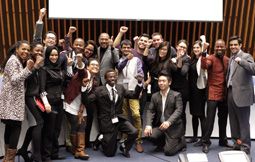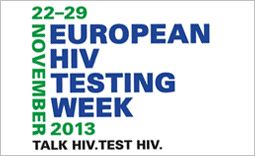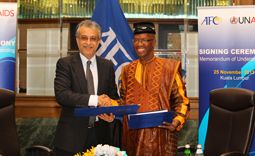
Feature Story
World AIDS Day 2007 - Statements
28 novembre 2007
28 novembre 2007 28 novembre 2007 |
United Nations Secretary General message on World AIDS Day, 1 December 2007 The theme of this World AIDS Day is leadership. Without it, we will never get ahead of the epidemic. (...) Today, I call for renewed leadership in eradicating stigma associated with HIV. I applaud the brave individuals who live openly with HIV, who advocate tirelessly for the rights of the HIV-positive, who educate others about AIDS. Read the UN Secretary General's message ( en | es | fr | ru | ar | ch ) |
|
|
|
 |
UNAIDS Executive Director, Dr. Peter Piot on World AIDS Day, 1 December 2007 Today, millions of people around the globe are marking the 20th World AIDS Day. For some, this may be the only day in the year they think about AIDS. For many, however, AIDS is part of daily life. Read the UNAIDS Executive Director's message ( en | es | fr | ru ) |
|
|
|
 |
The World Food Program, on World AIDS Day, 1 December 2007 As communities gather to mark World AIDS Day, and governments take stock of the progress towards achieving the Millennium Development Goals, the United Nations World Food Programme (WFP) is urging that more attention be paid to the fundamental connection between hunger and health, which lies at the heart of the pandemic. Read the full statement |
|
|
|
 |
Director-General of UNESCO, Mr Koïchiro Matsuura, on World AIDS Day, 1 December 2007 This year, World AIDS Day is dedicated to the theme of ‘leadership’. It is a theme that recognizes the need for a strategic vision, for focused and sustained action, for empowerment and motivation, and for accountability. |
|
|
|
 |
United Nations Development Programme, on World AIDS Day, 1 December 2007 The World AIDS Campaign has selected “leadership” as the 2007 World AIDS Read the full statement ( en | fr | es ) |
|
|
|
 |
International Labour Organization, on World AIDS Day, 1 December 2007 Today the World AIDS Campaign calls on us to focus on the role of leadership in keeping the promise to stop AIDS. (...) The ILO’s engagement is founded on our globally endorsed goal of promoting Decent Work - based on rights at work including freedom from discrimination, expansion of employment opportunities, social protection for all and social dialogue. Read the full statement ( en | fr | es ) |
|
|
|
 |
Thoraya Ahmed Obaid, UN Under-Secretary-General, UNFPA Executive Director on World AIDS Day, 1 December 2007 Today, on World AIDS Day, we are called upon to be leaders in the fight against AIDS. Where there is strong and committed leadership, the response is more effective. Read the full statement ( en | fr | es | ar ) |
|
|
|
 |
The Global Coalition on Women and AIDS, on World AIDS Day, 1 December 2007 On this World AIDS Day, the Global Coalition on Women and AIDS remembers the women whose lives have been touched by the epidemic -- women living with HIV, women who have lost their spouses, children, family members and friends to AIDS, caregivers both young and old, women and girls who find themselves distant from the halls of power, but who nonetheless are powerful leaders in their own families and communities. Read the full statement |
|
|
|
 |
United Nations High Commissioner for Human Rights, Louise Arbour on World AIDS Day, 1 December 2007 This year, as we mark World AIDS Day, we do so in a world where 6,800 HIV infections are occurring and 5,700 people are dying of AIDS daily. An individual's survival prospects frequently hinge upon his or her place of birth, residence and socio-economic status. This is both an affront to human dignity and a challenge to leadership at global, national and local levels. |
|
|
|
 |
General Secretary of the International Confederation of Trade Unions, Guy Ryder, on World AIDS Day, 1 December 2007 Twenty-five years into the AIDS pandemic we have seen many promising breakthroughs over the years. Like peeling back the skin of an onion, the trade unions, who have taken leadership in the workplace approach on HIV-AIDS in many countries, have found that devising the right response to AIDS often reveals another layer. By increasing prevention and access to AIDS treatment, the years of neglect of health care systems and the deteriorating conditions for health care workers have been made all too clear. Strengthening health care systems is a priority challenge that must be taken up, but this is no time for band-aid solutions. One thing is certain-it makes little sense to offer solutions to the pandemic without improving the health care system including the conditions for its workers. |
|
|
|
 |
Gaetano, UNAIDS Special Representative on World AIDS Day, 1 December 2007
Today, World AIDS Day, we are asking our leaders to ‘keep the promise’ and ‘stop AIDS.’ We are asking them to honor their political commitments made publicly; we are pushing them to come as close as they can to universal access to prevention, treatment and care by 2010. But as we demand that our political leaders keep their promises, we - you and I - must make the same demands of ourselves. We must make a personal promise to be actively engaged in the AIDS response by preventing any new HIV infections - that is the only way AIDS will stop. We can begin realizing this promise by knowing our HIV status. Remember to keep the promise because stopping AIDS starts with you and me. |
|
|
|
 |
Mary Fisher, UNAIDS Special Representative on World AIDS Day, 1 December 2007 We have enough science to find and treat AIDS. We have the medical knowledge we need to keep people alive. Nonetheless, on World AIDS Day 2007, tens of millions of people are dying, 17 million children have been orphaned -- and the numbers climb by the hour. How is this possible when we have enough science to stop it? It is possible because the world’s leaders have not turned their full power on arresting this pandemic. On World AIDS Day, if you would join with me, I’d ask you to do two things. Lend your support to the HIV/AIDS caregivers – the dedicated women and men who carry the orphans, rescue the dying and protect those not yet infected. And make your voice heard in the halls of power, calling our leaders to redouble their efforts. |
|
|
|
 |
Elizabeth Mataka, UN Special envoy on AIDS in Africa, on World AIDS Day, 1 December 2007 Today, on the 20th World AIDS Day, we are again beseeching leadership to ‘Stop AIDS and keep the promise.’ We asked them to do so last year, and we are asking them to do so again. Although much has been done since the last World AIDS Day, AIDS clearly has not stopped. Stopping AIDS is the ultimate measure of progress in the AIDS response, but we must remember that it is not the only one. |
|
|
|
 |
Prof Lars O. Kallings, UN Special envoy on HIV/AIDS in Europe, on World AIDS Day, 1 December 2007 Social cohesion is key to HIV prevention and treatment; no nation will be able to control the epidemic without a common feeling of mutual respect between individuals and communities – as well as between authorities and citizens. Solidarity is a hallmark of the maturity of a society. Let us work against discrimination and stigmatization and we will conquer HIV! |
|
|
|
 |
His Holiness Benedict XVI, Pope on World AIDS Day, 1 December 2007 "December 1 marks World AIDS Day. I remain spiritually close to everyone suffering from this terrible sickness, and to their families, especially those who have lost a loved one. To everyone I give assurances of my prayers. Furthermore, I wish to exhort all people of good will to increase their efforts to halt the spread of the HIV virus, to combat the disdain which is often directed towards people who are affected by it, and to care for the sick, especially those who are still children." |
|
|
|
 |
The Archbishop of Canterbury on World AIDS Day, 1 December 2007 The churches have not always challenged as they should the stigma that is attached to HIV and Aids in many countries. They have failed to say that those living with HIV and Aids are God’s beloved children, with dignity, liberty and freedom. What is owed to them is what is owed to any human being made in God’s image, and the more we are trapped by thoughts and images about stigma, the less we shall be able to respond effectively. |
|
|
|
 |
Caritas Internationalis on World AIDS Day, 1 December 2007 Religious leaders can, should, and do exercise a leadership role by facilitating accurate information and by promoting responsible behaviour to prevent the further spread of HIV, by giving leadership on providing health, social, and pastoral service to people affected by or vulnerable to the pandemic, and making tangible efforts to eliminate the irrational fear, stigma, and discrimination resulting from this global health challenge. |



